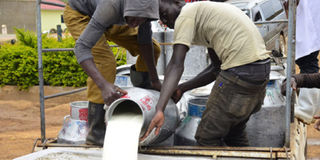Prime
Dairy farmers turn to solar to reduce costs

Workers supply milk. PHOTO/RACHEL MABALA
What you need to know:
- Research conducted by Makerere University in 2013 indicated that 32 per cent of milk is wasted, with 16 per cent lost to spoilage during transportation, 7 per cent at farm level, while 9 per cent is lost during handling and marketing.
Farmers in the cattle corridor have turned to solar as they seek alternatives to diesel and the highly unreliable grid electricity.
Speaking during a tour of dairy activities in Ngoma Sub-county, Nakaseke District, Mr Mwamed Sizoomu, the Solarpipo founder and operations manager, said solar had become a better alternative with capacity to improve the dairy value chain. Solarpipo, currently operates four projects with a minimum of 200 farmers in the cattle corridor.
However, Sizoomu noted the sector is facing a number of challenge, among which include lack of skills and a large knowledge gap, which affects utilisation and productivity.
Solar energy has become a viable alternative in most parts of Uganda as both grid and diesel energy continue to be inaccessible and expensive.
The 2020 Household Survey indicated that solar usage had grown to 32 per cent compared to grid connections that dropped from 22 to 19 per cent.
Recently, Ms Hadija Nakakande, the National Agricultural Advisory Services spokesperson, said government was providing farmers with solar-powered coolers due to growth in solar access.
Research conducted by Makerere University in 2013 indicated that 32 per cent of milk is wasted, with 16 per cent lost to spoilage during transportation, 7 per cent at farm level, while 9 per cent is lost during handling and marketing.
Mr Steven Kamushaija, a dairy farmer with about 10,000 litres of milk capacity in Ngoma Sub-county, said power outages, which would go up to six hours, had become a threat, noting that solar had provided an opportunity for improvements in the dairy sector.
A number of farmers in Ngoma, he said, had experienced losses resulting from power outages and cost of diesel, noting that solar had become the best alternative in the area.
“Sometimes the generator would break down yet you have milk that would go to waste,” he said, noting he has since shifted to solar, which is cost efficient and effective, especially in preserving the milk.
However, Mr Sizoomu said, a number of people have kept away from solar on the assumption that it is expensive, noting that solar might be costly in the initial stages but becomes affordable in the long term.




